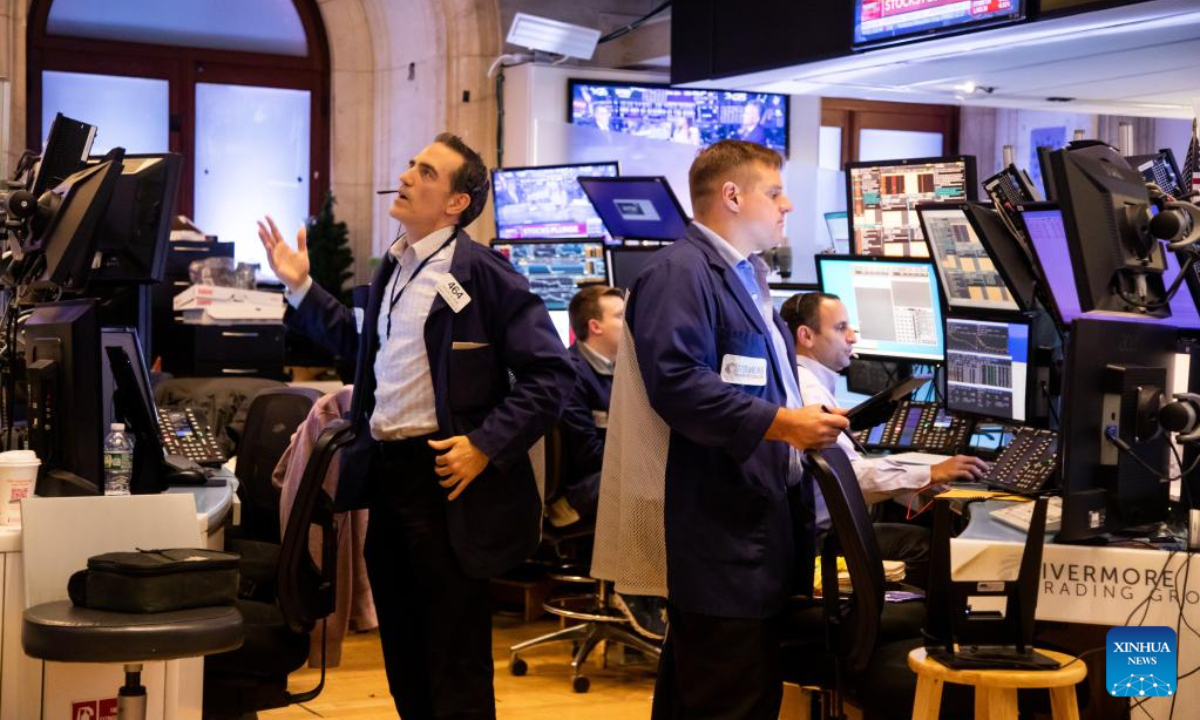
Traders work at the New York Stock Exchange (NYSE) in New York, the United States, on Aug. 26, 2022. Photo:Xinhua
The US stock markets on Friday declined in a selloff after the US Federal Reserve (Fed) Chair Jerome Powell reaffirmed plans to keep raising interest rates aggressively despite cost of worsening US' current economic recession and Chinese analysts warned of the double spillover risks from the US to countries across the world.
The Fed must continue to raise interest rates and hold them at a higher level until it is confident inflation is under control even if unemployment rises, Powell said on Friday at the Jackson Hole symposium of central bankers and academics, The Wall Street Journal reported.
After the US Fed chief's tough talk on further interest hikes, the Dow Jones Industrial Average on Friday sank 1,008.38 points, or 3 percent, to 32283.40, the index's biggest one-day drop since May. The S&P 500 fell 141.46 points, or 3.4 percent, to 4057.66. The Nasdaq Composite slid 497.56 points, or 3.9 percent, to 12141.71.
Investors' confidence has further been hammered as the Fed, which has been struggling to seek a balance between avoiding a further deterioration of the recession and taming the skyrocketing inflation, seems to choose to continue its radical interest hikes, experts said.
All countries including China should remain highly vigilant to the potential impacts on their exports due to US' economic recession getting worse and possible capital outflows as the US Fed reaffirms plans of aggressive interest rates hike, said Yu Xiang, a research fellow at Center for International Security and Strategy, Tsinghua University.
Against a backdrop of gloomy prospects for most of the world's economies, the continued rise of dollar threatens to accelerate capital flows to the US, Yu said, adding that developing countries that are already mired in debt should be especially wary.
The US Fed announced on July 27 to raise interest rates by 75 basis points, the fourth time the Fed has raised interest rates this year and the second in a row by 75 basis points, according to the Xinhua News Agency.
Prior to Powell's latest speech, an increasing number of experts have warned that the Fed's aggressive monetary policy would strengthen the dollar, accelerate capital flows to the United States, and have spillover effects on other countries. Some developing countries such as Sri Lanka are already in deep debt crisis.
The dollar index gained on Friday after the Fed chief adopted the hawkish tone to battling inflation. The dollar index was last at 108.83, up 0.33 percent on the day.
US' gross domestic product shrank at a 0.6 percent annualized rate last quarter, continuing contraction from the 1.6 percent contraction in the first quarter, according to US Bureau of Economic Analysis (BEA), which means the country has entered recession with two quarters consecutive contraction.
If the US Fed's aggressive monetary policy further exacerbates the US recession, US demand weakens, and considering US' selective trade policies toward other countries, this may cause a decline in exports from other countries, including China, Yu said.
Global Times




